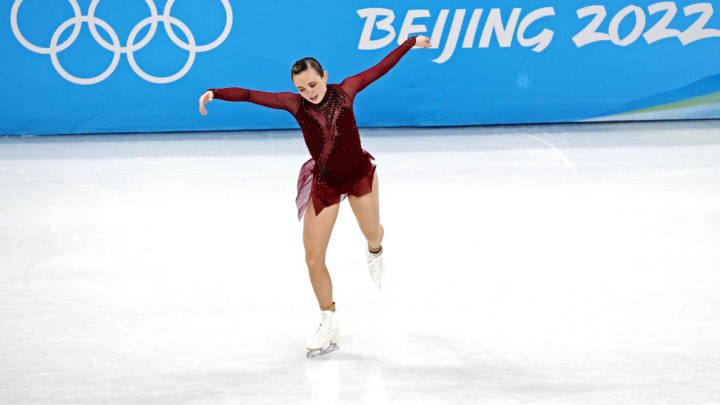The Sustained Sorrow of Figure Skating Music

BEIJING — Most days, when Australian figure skater Brendan Kerry arrives at the practice rink, he heads straight for the sound system, where he plugs his iPhone into the aux cable and breathes a sigh of relief.
“They’re like, ‘What are you doing?’” he said. “I’m like, ‘I just can’t stand this skating music anymore.’”
It makes him sad, he said, “all the time.” This gives him something in common with fans watching for the first time in four years and wondering: Why are these Olympians skating to music seemingly better suited to the soundtrack of Grey’s Anatomy than to elite athletic competition?
Until 2018, when the International Olympic Committee first allowed figure skaters to use music with lyrics at the Games, most of them used similar classical pieces, which evoked box seats more than tissue boxes. But tune into a broadcast these days and prepare to feel weepy.
Kerry is part of the problem, and he knows it. He performs his short program to “Leave a Light on” by Tom Walker (sample lyric: “I refuse to lose another friend to drugs”) and his free skate to a medley of songs that bring him down even on a good day.
“I hear mine and I’m just like, What is going on?” he said with a sigh. But he has no choice: “I’m stuck in a bit of a situation where based on my body build [5'9"] and how I’ve been brought up to skate and move on the ice, I’m not necessarily one of those guys who can get away with one of those hip-hop or lighthearted programs. We’ve got to do what’s best for our performance.” He once skated to “Singin’ in the Rain” and had the time of his life. “Afterward, everyone was like, ‘That was amazing. That was great,’” he said. “‘But.’”
So Kerry joined the legions of skaters who can make fans cry with their music as they make them cheer with their performances.
“I think that people are trying to go for music that they can really relate to or really connect to, or that they look good doing,” said Jason Brown of the U.S. “It really just depends on the style of the skater, but they just want to be comfortable. But I do think maybe skaters have an ability to connect with those types of songs sometimes, where it's easier to portray [sadness] than other emotions.”
There are a few ways to deal with the sustained sorrow. Some skaters just choose to embrace the feelings the sad songs stir up. “I love slow music,” said Mariah Bell of the U.S., who performs her free skate to K.D. Lang’s cover of “Hallelujah.”
Some skaters cope by identifying other themes in their music, whether they are there or not. One of the most devastating songs of the aughts is Coldplay’s “Fix You,” which provides the backdrop to the free skate of American pairs skaters Alexa Knierim and Brandon Frazier. They say they don’t find the song depressing.
“There’s so much more meaning behind it than just the lyrics,” said Knierim.
“It’s just about struggle and finding exactly what you need, and always striving and striving for more, and then at the end, getting what you get and basically everything making a full circle in life,” said Frazier.
(Chris Martin, who wrote “Fix You,” has said it is about watching his then-wife, Gwyneth Paltrow, grieve her father’s death.)
Some skaters try to avoid the sad stuff altogether. For his short program last week, Adam Siao Him Fa of France skated to a remix of “The Imperial March” from Star Wars. “We wanted a theme that was very original and very well-known,” he said in French. “It’s not necessarily figure skating music.”
Nathan Chen, the American who won gold in the men’s individual event, performs his free skate to an Elton John medley. “The music is super, super fun,” he said. “It’s happy and exciting, and so that really helps me. As a figure skater, you have this opportunity to skate to music, and music always helps bring out energy.”
American Karen Chen, who is not related to Nathan, came to the same realization this year. She initially performed her short program to a portion of the soundtrack from the movie Lady Caliph, but just before U.S. nationals in January, she switched to a combination of “Requiem for a Tower” by Escala and a portion of the Requiem for a Dream soundtrack.
“It's the Olympic year,” she said. “I'm already feeling tons of emotions, tons of stress, tons of pressure. And then my music was so beautiful, but it was depressing. So every single time I got into my pose and started my program I’d be like, ‘Yeah, I don't want to do this.’”
And some take the approach of U.S. skater Alysa Liu, who performs her free skate to a figure skating classic, Tchaikovsky's “Violin Concerto in D.” She finds it easy to avoid the melancholy because most of her training partners use upbeat music. And beyond that, “I don’t watch that much figure skating,” she admitted. Then, perhaps for that very reason, she grinned.
More Winter Olympics Coverage:

Stephanie Apstein is a senior writer covering baseball and Olympic sports for Sports Illustrated, where she started as an intern in 2011. She has covered 10 World Series and three Olympics, and is a frequent contributor to SportsNet New York's Baseball Night in New York. Apstein has twice won top honors from the Associated Press Sports Editors, and her work has been included in the Best American Sports Writing book series. A member of the Baseball Writers Association of America who serves as its New York chapter vice chair, she graduated from Trinity College with a bachelor's in French and Italian, and has a master's in journalism from Columbia University.
Follow stephapstein